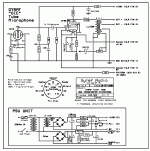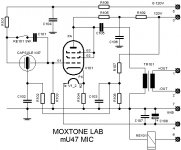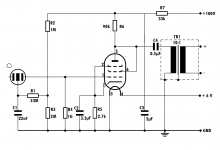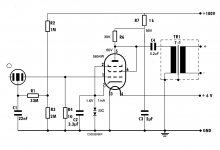I'm planning a microphone build, and wondering what tube to use. Being a bit of a completist I'm listing the tubes used in existing mics. Quite a few are just one side of a double triode, and another bunch are pentodes in triode, which makes more sense to me. There's a further bunch that are subminiature tubes, but I'm not really interested in those since I'd like a socketed tube to make experiments, 9 pin like EF86 or 7 pin like 6AK5/5654W. There are a large number of useful Russian pentodes that could sound good in triode. Requirements here are a lowish anode voltage and reasonably low noise. Transformer out would be Lundahl 7:1.
Thoughts and suggestions?
12AX7 Vanguard V13, AIR Liberator, AKG P820, AKG SolidTube, t.bone SCT800/SCT700, Charter Oak H1000A/S600/SA538, Lewitt LCT840/940, Behringer T1/T-47, Aseyer D36A, SM Pro MC03, Karma K58, Big Sound Big, SE Gemini/X5600a II/2200T/RT1/ICIS, Sontronics Omega/Helios, TSM Muneo, Art M-Four, TNC ACM-1200, CAD VX2, ShuaiYin SYT1200
12AT7 MXL 9000/V67, Rode NTV, Manley Ref. Gold, Cascade V55, MXL Genesis, Telefunken RFT AR-51/C12/ELAM251, Horch RM4, SE Z5600
6072 CAG C12 CG, Golden Age TC1, Advanced Audio CM-67, Rode Classic, Manley Ref. Cardioid, Cascade V55, Telefunken ELAM 270/ELAM14/RFT AR-70/Cinemic/250E/250F/251T/251E/251F/RFT M216/, 797 U95S, AKG C-12, Studio Projects T3/TB1, Peluso P12, Guage ECM-47, Peluso Lab 22-47, Avantone BV-1, Soundelux U95
12AU7 SE RNT, Lauten LT-381 Oceanus,
LMG-95-ES Mullard Lucas CS1, CS9
6922 Lawson L251, Blue Stage 2, Red Type A,
6N1P
6111 Neumann M147/149/150
6SJ7/5693 Peluso Lab 22-47 SE,
EF12/14 Pearlman TM-47, Flea 47 Next, Flea 47, Wunder CM7, Telefunken U47M,
EF80/EF800 Bock 241, Miktek CV4,
EF86/EF806/6267 Lauten Eden LT-386, CAG U67 CG, MXL Revelation/Solo, Cathedral Pipes Regensburg Dom, Wunder CM67, Brauner VM1/ValvetX, Microtech Gefell CMV563/UM75/M92.1/UM92.1/M990Art, Neumann U67, Stellar CM6, Soundelux U95,
EF94/6AU6 Sony C-37A,
EF732 Telefunken RFT AK47, Soundelux E250/E49
EF814 Bock 407,
6S3P Handcrafted Faust,
6S6B-V Oktava MKL-012
VF-14 Telefunken U-47, Lucas CS-4,
5654 Soyuz SU-017, TNC ACM-900, ShuaiYin SYT9000, Stellar CM4, Peluso P67/TR14, Telefunken CU-29, Lauten 321,
EC92 Oktava MKL-111, Neumann UM-57/CMV-563,
5840 Mojave MA-1000/MA-300, Blackspade UM25/UM17, Chameleon TS-1, Bock 50, McHigh AMM-68, Royer SF-24
6S6B-V Soyuz SU-011
6205 Groove Tubes GT66/GT67/GT44, Sterling ST66/ST69, M-Audio Sputnik,
AC701 Schoeps M221B/M222, Neumann SM-69/KM54/M249/M49/M50/M269, Telef. ELAM 251/250/
DL651/DL67 Microtech Gefell UM900
Nuvister Pearl DT40/CT40
Thoughts and suggestions?
12AX7 Vanguard V13, AIR Liberator, AKG P820, AKG SolidTube, t.bone SCT800/SCT700, Charter Oak H1000A/S600/SA538, Lewitt LCT840/940, Behringer T1/T-47, Aseyer D36A, SM Pro MC03, Karma K58, Big Sound Big, SE Gemini/X5600a II/2200T/RT1/ICIS, Sontronics Omega/Helios, TSM Muneo, Art M-Four, TNC ACM-1200, CAD VX2, ShuaiYin SYT1200
12AT7 MXL 9000/V67, Rode NTV, Manley Ref. Gold, Cascade V55, MXL Genesis, Telefunken RFT AR-51/C12/ELAM251, Horch RM4, SE Z5600
6072 CAG C12 CG, Golden Age TC1, Advanced Audio CM-67, Rode Classic, Manley Ref. Cardioid, Cascade V55, Telefunken ELAM 270/ELAM14/RFT AR-70/Cinemic/250E/250F/251T/251E/251F/RFT M216/, 797 U95S, AKG C-12, Studio Projects T3/TB1, Peluso P12, Guage ECM-47, Peluso Lab 22-47, Avantone BV-1, Soundelux U95
12AU7 SE RNT, Lauten LT-381 Oceanus,
LMG-95-ES Mullard Lucas CS1, CS9
6922 Lawson L251, Blue Stage 2, Red Type A,
6N1P
6111 Neumann M147/149/150
6SJ7/5693 Peluso Lab 22-47 SE,
EF12/14 Pearlman TM-47, Flea 47 Next, Flea 47, Wunder CM7, Telefunken U47M,
EF80/EF800 Bock 241, Miktek CV4,
EF86/EF806/6267 Lauten Eden LT-386, CAG U67 CG, MXL Revelation/Solo, Cathedral Pipes Regensburg Dom, Wunder CM67, Brauner VM1/ValvetX, Microtech Gefell CMV563/UM75/M92.1/UM92.1/M990Art, Neumann U67, Stellar CM6, Soundelux U95,
EF94/6AU6 Sony C-37A,
EF732 Telefunken RFT AK47, Soundelux E250/E49
EF814 Bock 407,
6S3P Handcrafted Faust,
6S6B-V Oktava MKL-012
VF-14 Telefunken U-47, Lucas CS-4,
5654 Soyuz SU-017, TNC ACM-900, ShuaiYin SYT9000, Stellar CM4, Peluso P67/TR14, Telefunken CU-29, Lauten 321,
EC92 Oktava MKL-111, Neumann UM-57/CMV-563,
5840 Mojave MA-1000/MA-300, Blackspade UM25/UM17, Chameleon TS-1, Bock 50, McHigh AMM-68, Royer SF-24
6S6B-V Soyuz SU-011
6205 Groove Tubes GT66/GT67/GT44, Sterling ST66/ST69, M-Audio Sputnik,
AC701 Schoeps M221B/M222, Neumann SM-69/KM54/M249/M49/M50/M269, Telef. ELAM 251/250/
DL651/DL67 Microtech Gefell UM900
Nuvister Pearl DT40/CT40
EF86 every time. Use plenty of NFB in your design and the gain of the EF86 will cope very well and there will be no noise.
EF86 every time. Use plenty of NFB in your design and the gain of the EF86 will cope very well and there will be no noise.
It's a strong contender. A 9 pin socket would accommodate a lot of other possible tubes. For 7 pin, the Jan 5654 aka 6ZH1P in EV version is well respected.
Could EF98 ever be considered as a replacement for an EF86? With Va 25v, it has similar anode current (2.2mA) and gm (2.1mA/V) as an EF86. It was designed for car radios, so I was wondering whether that meant it has to be very resilient to vibration?
EF98 tube data
EF98 tube data
Here's a simpler circuit. I've never biased a capsule before - should be somewhere between 48v and 60v from what I read. This could be tried with the 5654 with either a resistor load or a plate choke. I think I'm getting closer - I read that 5654 is a good low voltage tube.
Attachments
The Russian 6J10B-V / 6Zh10B-V HF pentode valve is a contender as well as it is sub miniature wired 7 leads.
6J10B-V 6ZH10B-V Russian tiny HF PentodeTubes MELZ plant 1980s [6j10b-V-NOS-90S] - $1.45 : Siberian-shop, Electronic tubes, ICs, capacitors and sockets
And less than a pound each!
8x 6J10B-V / 6Zh10B-V USSR Miniature HF pentode tube. NOS | eBay
6J10B-V 6ZH10B-V Russian tiny HF PentodeTubes MELZ plant 1980s [6j10b-V-NOS-90S] - $1.45 : Siberian-shop, Electronic tubes, ICs, capacitors and sockets
And less than a pound each!
8x 6J10B-V / 6Zh10B-V USSR Miniature HF pentode tube. NOS | eBay
What I don't get with subminiature tubes is why they are used in microphones when they have a relatively short lifetime compared with the more usual 7 and 9 pin types. 5840 lifetime is "not less than 450hrs".
Anyway, I've redrawn a circuit with the 5654W to give what looks to me like a better operating point, and used 2 SIC diodes for bias. These are what I use in my regular 26 preamp, and they seem to come out at around 0.8V each. The 0.2uF coupling cap would be 2 of 0.1 Russian Teflons, FT-2.
Anyway, I've redrawn a circuit with the 5654W to give what looks to me like a better operating point, and used 2 SIC diodes for bias. These are what I use in my regular 26 preamp, and they seem to come out at around 0.8V each. The 0.2uF coupling cap would be 2 of 0.1 Russian Teflons, FT-2.
Attachments
I used 6N16B with a great result in a stereo microphone, but I used them as cathode followers. When selecting the tube you want to prefer the one with as lower as possible control grid current in working conditions, to save low frequency response of the capacitive capsule loaded on grid leak resistor.
Hello Anatoliy! thanks for the email. How do you tell the control grid current in working conditions from the data sheet?
Have you ever used the 6ZH1P-EV for anything (5654W)? This will be the first one I try. I also have an EF86, and some 6e6, which is a higher current tube.
Did the last schematic I posted look OK to you? Any changes you would suggest?
Have you ever used the 6ZH1P-EV for anything (5654W)? This will be the first one I try. I also have an EF86, and some 6e6, which is a higher current tube.
Did the last schematic I posted look OK to you? Any changes you would suggest?
The peeps over on GroupDIY seem to like the Soviet 6S6B-V as a replacement for AC701.
The thread initially piqued my interest as I was fortunate enough to have been gifted some unneeded 1/4" capsules, which take a 200-300V bias, and I have been slowly working towards building a one off microphone, tube amplified, probably using 5744 tube (as they have a certain something, a unique non linearity)
I can't imagine why, other than the tube is pretty linear, and good low noise subminiature triode.
I cant imagine either, that it can be performing in a way that can truly be compared to AC701, at low anode voltages, even if cathode emission of the 6S6B seems more than adequate at reduced filament volts (I.e. 4V)
I must not understand enough about condenser mics, as I would assume that a greater mu would be needed. Admittedly, my own efforts have been stymied by other projects I have been working on.
I.e. why is noone using 6S7B-V rather than 6S6B?
The thread initially piqued my interest as I was fortunate enough to have been gifted some unneeded 1/4" capsules, which take a 200-300V bias, and I have been slowly working towards building a one off microphone, tube amplified, probably using 5744 tube (as they have a certain something, a unique non linearity)
I can't imagine why, other than the tube is pretty linear, and good low noise subminiature triode.
I cant imagine either, that it can be performing in a way that can truly be compared to AC701, at low anode voltages, even if cathode emission of the 6S6B seems more than adequate at reduced filament volts (I.e. 4V)
I must not understand enough about condenser mics, as I would assume that a greater mu would be needed. Admittedly, my own efforts have been stymied by other projects I have been working on.
I.e. why is noone using 6S7B-V rather than 6S6B?
Last edited:
Of course the AC701 mu is about 20, and 6S6B about 25.
Filament current is the biggest issue in my interpretation.
Also 6Zh5/6sh5/6J5 looks more suitable on ALL fronts (no idea of noise as I have no experience of them but datasheet indicated more than double the microphonis noise of the 6S6B) Pity, because the valve is far more suited to the usual mic bias voltages.
6S1J also looks like one of the better devices (presuming they're available)
Filament current is the biggest issue in my interpretation.
Also 6Zh5/6sh5/6J5 looks more suitable on ALL fronts (no idea of noise as I have no experience of them but datasheet indicated more than double the microphonis noise of the 6S6B) Pity, because the valve is far more suited to the usual mic bias voltages.
6S1J also looks like one of the better devices (presuming they're available)
Last edited:
I'm not keen on subminiature tubes with flying leads - I don't need the reduced size since I plan on using a generous size case. Plus I want to do some tube rolling. Mu needs to be over 30 since I'm planning on a 7:1 OPT. Attached preliminary stage of microphone case. I may or may not use the 156C plate choke. Needs a 7:1 Lundahl transformer in there too. The two FT-2 0.1uF teflon coupling caps are what I always use in my audio builds.
Attachments
Even so, then you could try out the 6N16B-V. Solder the leads to a 9 pin plug to go to the socket. You should allow youself to listen to it. It´s sound signature is "to die for" 🙂
I´ll shut up now😀
I´ll shut up now😀
Even so, then you could try out the 6N16B-V. Solder the leads to a 9 pin plug to go to the socket. You should allow youself to listen to it. It´s sound signature is "to die for" 🙂
I´ll shut up now😀
That's a pretty strong recommendation! Thanks - I'll look it up! It's great to have you guys' actual experiences working with these kind of tubes. Nothing's off the table at this stage.
I need to find out where you put your hands on a 9 pin plug, and a 7 pin plug maybe. There are some on eBay from China - seem to be called "socket savers"
I remember when I last used subminiatures I used 8 pin DILs. I also remember they ran down rather quickly, but that might have just been the particular tube.
Last edited:
Or another approach....
The russian pencil triode 6S32B, mU around 100, typical noise less than 1mV, and to my experience not even microphonic at all 🙂
Isnt that just a single (more modern?) Version of 6N21B?
Even so, then you could try out the 6N16B-V. Solder the leads to a 9 pin plug to go to the socket. You should allow youself to listen to it. It´s sound signature is "to die for" 🙂
I´ll shut up now😀
And 6N16B just a dual version of 6S6B?
FWIW some submini arent half what their rep would suggest.
6111, and 6021 have been quite a disappointment to me, compared to 6N16B and 6S6B (I think I'm beginning to really like 6S3B too)
The only real low voltage valves I have are 1sh29b rod pentodes, and I'm not sure a DHT will work well or at all! But I am itching to triode wire them!
6S1J isnt a wire ended submini, but an Acorn tube. Not sure that makes mounting any easier though....
Last edited:
That's a pretty strong recommendation! Thanks - I'll look it up! It's great to have you guys' actual experiences working with these kind of tubes. Nothing's off the table at this stage.
I need to find out where you put your hands on a 9 pin plug, and a 7 pin plug maybe. There are some on eBay from China - seem to be called "socket savers"
I remember when I last used subminiatures I used 8 pin DILs. I also remember they ran down rather quickly, but that might have just been the particular tube.
I´m using 6N16B-V (with gold grids) in SRPP config as output on my DIY CS4398 dac. It´s always "on", and has been for at least 5 years now. No obvious reduction in sound quality yet 🙂
And for those who´ll state right away, that I get used to the slow degradation, I have a SS dac to compare it to 🙂
Hello Anatoliy! thanks for the email. How do you tell the control grid current in working conditions from the data sheet?
Have you ever used the 6ZH1P-EV for anything (5654W)? This will be the first one I try. I also have an EF86, and some 6e6, which is a higher current tube.
Did the last schematic I posted look OK to you? Any changes you would suggest?
can't tell that from the datasheet. I just breadboard and see if anode current is fine. If it is too low, grid current is too high for the 1G grid leak resistor.
By the way, in my microphones I use 18M only resistor, but it is bootstrapped (sharing the secret). ;-)
Wavebourn - It works, both capsules. I will continue... | Facebook
I´m using 6N16B-V (with gold grids) in SRPP config as output on my DIY CS4398 dac. It´s always "on", and has been for at least 5 years now. No obvious reduction in sound quality yet 🙂
And for those who´ll state right away, that I get used to the slow degradation, I have a SS dac to compare it to 🙂
Nobody wanted to go to prison for the tube failed in a military equipment during the warranty time. 😀
- Home
- Amplifiers
- Tubes / Valves
- Which tube for DIY microphone?




